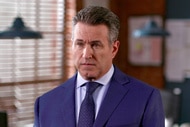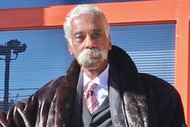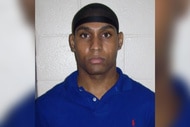Create a free profile to get unlimited access to exclusive videos, breaking news, sweepstakes, and more!
Did Real Estate Lawyer Watson Bryant Actually Represent Richard Jewell All By Himself?
In Clint Eastwood's movie "Richard Jewell," Watson Bryant is the lone lawyer fighting for his client, accused bomber Richard Jewell.

In director Clint Eastwood’s new movie “Richard Jewell,” the protagonist is represented by a feisty libertarian lawyer who teaches him to fight back against the system.
In the film, security guard Richard Jewell is accused of planting a bomb at the 1996 Summer Olympics in Atlanta, when he is actually the hero who found the bomb and saved lives. As the FBI pegs him as a possible lone bomber, Jewell reaches out to his previous employer Watson Bryant (played by Sam Rockwell), who by this point is only working as a real estate lawyer. He’d never represented an alleged murderer, let alone someone accused of a domestic terror attack that killed two people and injured another 111.
Despite his inexperience in criminal law, the film depicts Bryant fiercely protecting his often naive and childlike client. He's consistently loyal to him and in the end, his tenacity pays off as Jewell is cleared as a possible suspect after 88 days of intense scrutiny.
While in the film Bryant worked alone, he did have Nadya Light (played by Nina Arianda) who was both his law assistant and love interest. She often endearingly bossed Bryant around in a Russian accent. In the film, it was her who actually discovered that Jewell couldn't have made a call to police from a payphone like the FBI suspected.
So, was this how it went down in real life?
Well, not really.
The real Bryant, like the Bryant in the film, did real-estate closings by the time that Jewell was eyed as the possible bomber. He was no defense attorney. And, like in the movie, they had met years earlier while Bryant worked at a previous law firm: Jewell worked as a mailroom clerk at a federal disaster-relief agency where Bryant worked as a lawyer, according to a 1996 Vanity Fair piece.
“Jewell was then a stocky kid without a father, who had trained as an auto mechanic but dreamed of being a policeman; Bryant had always had a soft spot for oddballs and strays,” the piece states.
Light really did work as Bryant's assistant, though it's not clear if she assisted in the Jewell case. According to a LinkedIn which appears to be hers, she still works as a legal assistant for Bryant. She now goes as Nadya Bryant.
As the ending of the movie revealed, Jewell and Bryant’s friendship only strengthened following the terrorist accusations. Even after Jewell died in 2007, his mom continued to babysit Bryant and Light's children on a weekly basis.
But how on earth did a real estate lawyer successfully represent a man accused of domestic terrorism? Well, what differs from reality is the movie’s portrayal of Bryant as Jewell’s one and only lawyer. Jewell actually had several lawyers. In fact, he had an entire team.
In addition to Bryant, he had a legal team including Lin Wood, Wayne Grant, Jack Martin, Richard Rackleff, and Watson's brother Bruce, according to Slate.
"The truth is all the lawyers had major contributions to the case," Wood told Oxygen.com. "Bryant's character in the film was a composite character of all of us."
Wood noted that Bruce was not a lawyer but he "was very, very helpful to Richard's legal team in the first months in performing many tasks, including driving Richard to make sure he was at appointments."
He said that Rackleff was the the polygraph examiner whose knowledge of FBI workings contributed to the case in a significant way until the polygraph test was completed.
Watson hired Martin within a few days of taking on Jewell, case, Wood told Oxygen.com. Martin was a specialist in handling federal criminal cases. At that point, Martin became the lead criminal defense lawyer and Bryant operated as more of the public spokesperson lawyer and friend to Jewell, according to Wood.
Bryant did not return Oxygen's request for comment.
“It didn’t take me long to find out that it was impossible for him to make the 911 call,” Martin told Atlanta Magazine in 1996. “Didn’t take me long to find out that this man has friends and is gregarious and isn’t a loner like the profile.”
Wood said he got on board the day before the press conference, along with his then-partner Wayne Grant. The presser was held following Jewell taking a polygraph to prove he wasn't being deceitful.
Wood said that following the presser, he primarily led the law team as they filed multiple libel lawsuits against the media and Piedmont College, Jewell's former employer who spoke unfavorably about him in the media.
"We were defending him in the court of public opinion," Wood told Oxygen.com.
His former partner Grant was quoted in a 1996 Associated Press article, saying, “There will always be people out there who believe Richard is the bomber. There will always be people who stare. There will always be whispers of recognition.″
Wood said he continued fighting for Jewell in a lawsuit against the Atlanta Journal-Constitution for 16 years. The final five years of that battle were conducted after Jewell died in 2007.
Both Wood and Bryant attended Jewell's funeral. Bryant spoke and Wood was asked to give the eulogy, according to Wood.
"It was the hardest public statement that I ever made," Wood told Oxygen.com.
He called Jewell "a man that I loved and was dedicated to for 16 years. He had a big impact on my life and career."
Wood has represented people in other high-profile cases such as JonBenet Ramsey's parents. He currently represents Nick Sandmann, the teen accused of being a racist for his interaction with a Native American man outside the Lincoln Memorial in January.
Wood and Bryant, who still runs a law firm with Nadya, are all still based in Atlanta.
Jewell was formally exonerated in 2005, two years before his death, when the real bomber Eric Rudolph was convicted.
Editor's note: This story has been modified to reflect that Wood and Grant joined Jewell's legal team the day before a press conference was held to announce that Jewell passed a polygraph test. A previous version of this story incorrectly stated that the press conference was held to announce that Jewell was cleared as a suspect by the Department of Justice.


























